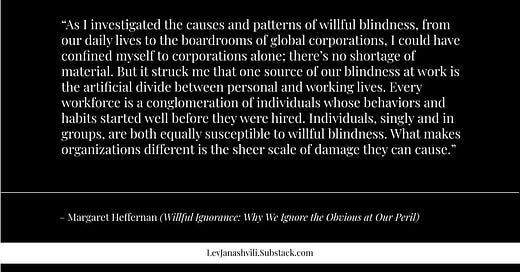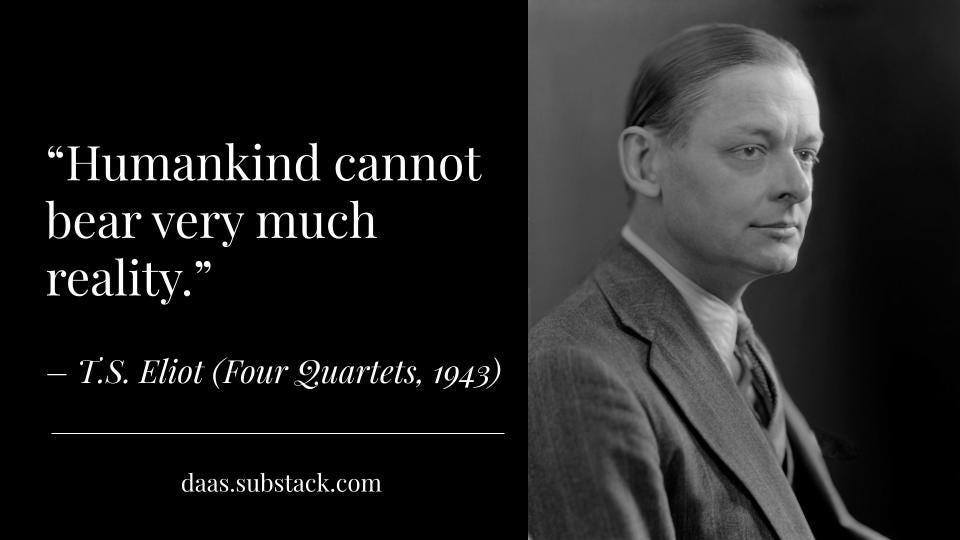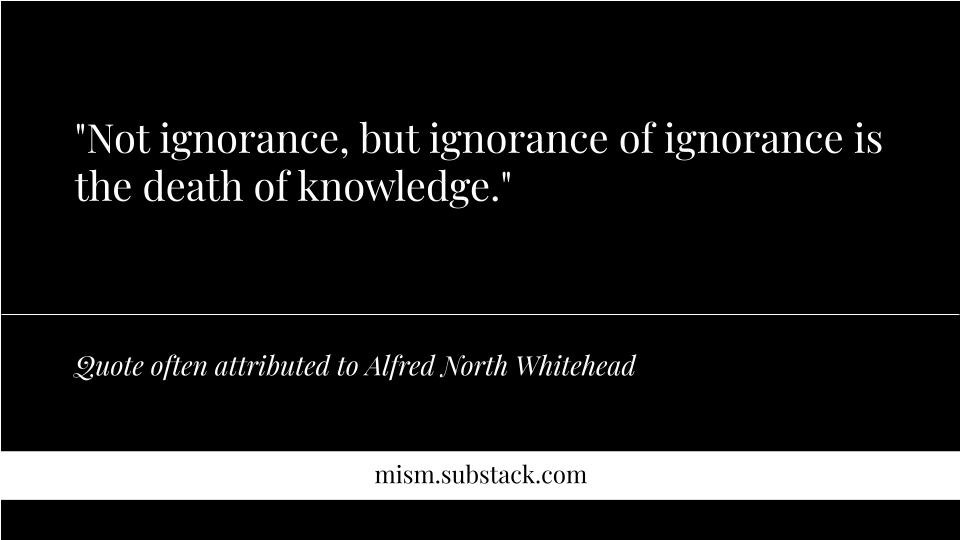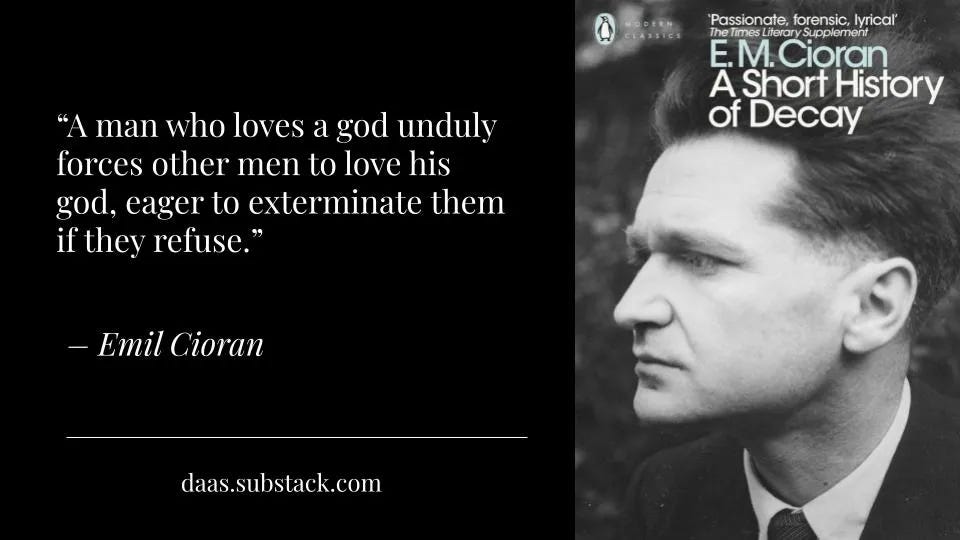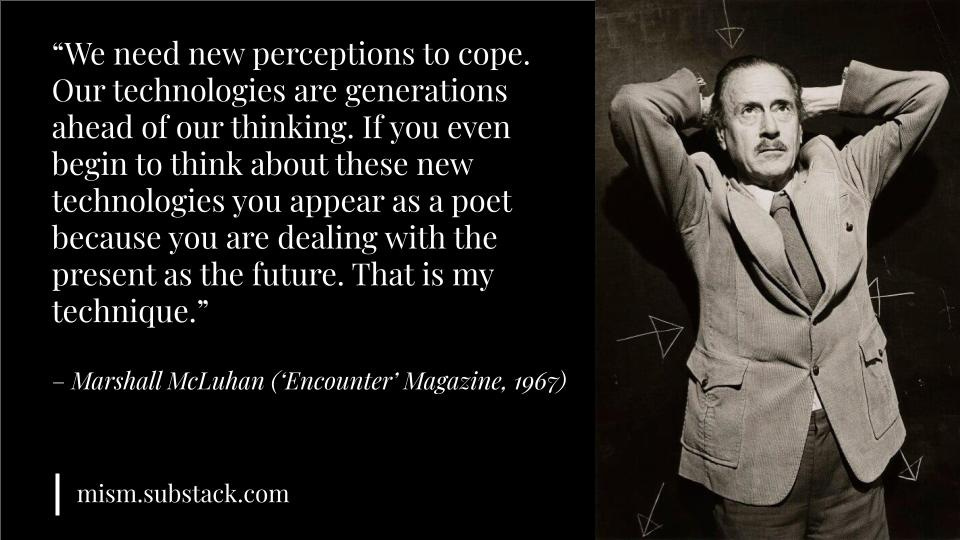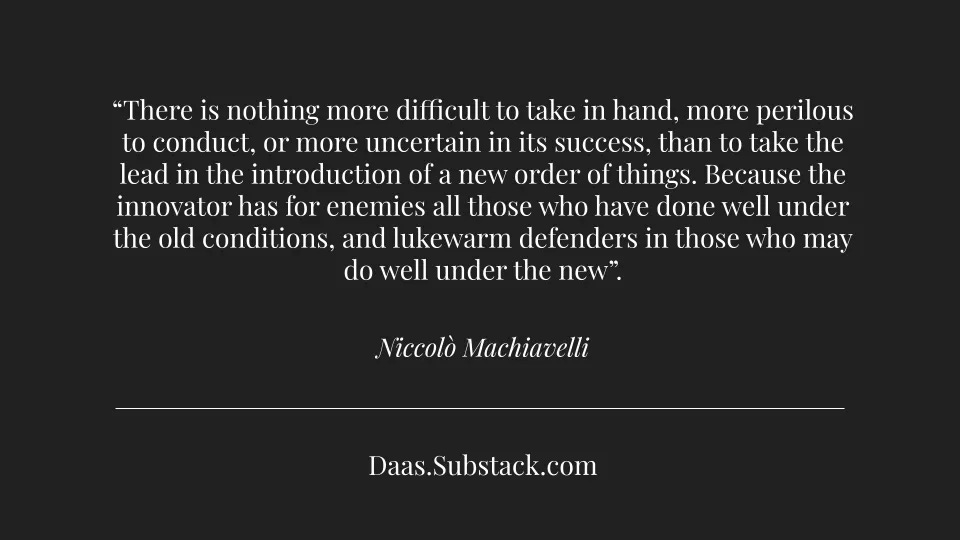In this post, I share recent readings and writings that suggest fruitful responses to willful ignorance. I felt this was an appropriate subject for a newsletter addressed to my post-LinkedIn professional network because, as Margaret Heffernan points out in the introduction to Willful Ignorance: Why We Ignore the Obvious at Our Peril:
As I investigated the causes and patterns of willful blindness, from our daily lives to the boardrooms of global corporations, I could have confined myself to corporations alone; there’s no shortage of material. But it struck me that one source of our blindness at work is the artificial divide between personal and working lives. Every workforce is a conglomeration of individuals whose behaviors and habits started well before they were hired. Individuals, singly and in groups, are both equally susceptible to willful blindness. What makes organizations different is the sheer scale of damage they can cause.
I recently examined willful ignorance as part of a broader typology of responses to existential threats. See Survival Strategies: Prophecy, Anti-Prophecy and Realism. I urge readers not to limit their thinking about survival strategies to the most dramatic examples of existential threats that may lead to the destruction of bodies, ecosystems, economies or the entire planet. Most of the time, willful ignorance is a response to less dramatic threats that may merely lead to the destruction of constructed identities.
In my typology of responses, Prophets and Realists understand the threats, but they differ in the way they metabolize their understanding. Anti-Prophets, on the other hand, survive by shielding themselves from the knowledge that transforms Prophets and Realists. Anti-Prophets are willfully ignorant, but when we examine this survival strategy as part of a broader typology of responses, we begin to see why the missionary zeal of Prophets and Realists generally serves to deepen willful ignorance — not only the willful ignorance of the Anti-Prophets but also of the missionaries themselves.
The Story of Willful Ignorance
Heffernan mentions several names for the Anti-Prophet’s survival strategy. In addition to ‘willful ignorance’, the names include ‘willful blindness’, ‘conscious avoidance’, ‘connivance’, ‘constructive knowledge’, ‘deliberate ignorance’, and ‘deliberate indifference’. These names come from legal cases in which courts needed a way to pierce the shield of plausible deniability.
For example, a person who was paid a large sum of money to transport a suitcase couldn't defend against the charge of drug trafficking with the claim that he didn’t know about the contents of the suitcase. To use a real-life example, Jeffrey Skilling and Kenneth Lay – respectively, CEO and Chairman of Enron – couldn’t claim that they didn’t know about the accounting fraud at the company. As the judge in the case wrote in his instructions to the jury:
“You may find that the defendant had knowledge of a fact if you find that the defendant deliberately closed his eyes to what would otherwise have been obvious to him. Knowledge can be inferred if the defendant deliberately blinded himself to the existence of a fact.”
Beyond the Story: Ignorance of Ignorance
However, the treatment of willful ignorance by legal systems only tells a small part of the story. The nomenclature suffices to allow the systems to do what they need to do (e.g., convict the Enron executives), but it reveals neither the ubiquity nor the mechanisms of Second-Order Ignorance (SOI),1 also known as ignorance of ignorance.
Digging deeper, we may come to psychoanalysis and ‘scientific psychology’, where we find a glut of academic and clinical insights into the mechanisms behind psychic defenses against reality. For example, we can explore concepts such as denial, suppression, repression, projection, dissociation, grandiosity, the Dunning-Kruger Effect, confirmation bias, groupthink, identity-protective cognition (aka the my-side bias), etc.
As for ubiquity, these and other defenses appear anywhere the psyche confronts reality, whether privately, interpersonally or publicly. These defenses play out in friendships and family relationships, corporate boardrooms and places of worship, military operations and nations consumed by mass psychosis. Whatever the context, Heffernan observes, “the central challenge posed by each case [of willful ignorance] wasn’t harm that was invisible, but harm that so many preferred to ignore.”
Iatrogenic Harm
As a feature of Anti-Prophecy, SOI is often immune to the messages of Prophets and Realists. Typically, one of the reasons for this immunity to messages is the corruption of the messengers who have lapsed into the shadow aspects of their own archetypes. Anti-Prophets turn instinctively defensive against the missionary zeal of Fanatical Prophets (FPs) and Depressive Realists (DRs). Collectively, I call these zealots Deluded Anti-Denialists (DADs).
These shadowy figures alienate Anti-Prophets who may be receptive to messages from more self-aware interlocutors. DADs approach SOI as a problem to solve, a resistance to overcome, an illness to cure, a virus to vaccinate against. They're totally blind to the ways in which SOI isn't a problem but a solution. Because of this selective awareness, DADs are often celebrated for their courage and clarity of vision. The problem is that they are celebrated by everyone but their target audience, which avoids them like the plague.
As marketers and communicators, DADs are tone-deaf. They don't hear the judgment and epistemic power grabs woven into their messages. Consider:
According to DRs, Anti-Prophets are trapped in SOI by the fear of loss and death, and to break out of this psychic prison, Anti-Prophets need to summon the courage to overcome this fear.
According to FPs, Anti-Prophets are trapped in SOI because they don't realize that death is only the beginning. For example, the FPs depicted in the film Bird Box (2018) argue passionately that “It's beautiful!”, referring to what comes after death.2
With these messages, DADs turn to hortatory preaching, but they just can't seem to deliver these messages in ways that affirm the Anti-Prophet’s thirst for life. DADs recognize willful ignorance in Anti-Prophets, but not in themselves. Under the spell of this shadow-projection, DADs continue to preach not only when no one is listening, but also when the audience is begging them to shut up. These preachers become what they bemoan: ignorant of their ignorance.
In most cases, SOI isn't treatment-resistant because the case is so severe, but because the treatment is part of the problem. It delivers iatrogenic harm.
Materials for My Memoirs
Until about 2014, I made a living as a DAD. My particular specialty involved telling institutional participants in financial markets that they systematically misprice risk, that corporations pay lip service to the idea of influence with integrity, that bogus accounting hides real risks, that “we” must psychoanalyze sustainability, and modernize accounting standards.
I didn't know this at the time, but 2014 marked the beginning of the end for the preaching phase of my career. By late 2016, I reached the end of the beginning. In my memoirs, I'll probably dedicate a chapter to the decade that started in 2014, but right now, I'm more interested in the decade that started this year.
New Horizons: Seize the Means of Perception
My motto for the decade ahead is “Seize the Means of Perception”. But this isn't the beginning of a new sermon; it's an answer to a Frequently Asked Question (FAQ) in any job search: What is the challenge to which I can offer a uniquely fruitful response? As I suggested in Readings on Resistance (quoting The Convivial Society), the challenge for the next decade is to “resist the enclosure of the human psyche.”
The enclosure of the commons is the name given to the centuries-long process by which lands available to the many were turned into a resource to be managed and extracted by the few. My claim is that structurally similar processes are unfolding with the aim of enclosing the human psyche and transforming it into a resource to be managed and extracted.
Whether we examine the way this process unfolds in our personal or professional lives, this examination warrants our highest attention because, in Marshall McLuhan’s words:
Once we have surrendered our senses and nervous systems to the private manipulation of those who would try to benefit from taking a lease on our eyes and ears and nerves, we don’t really have any rights left.
And
We need new perceptions to cope. Our technologies are generations ahead of our thinking. If you even begin to think about these new technologies, you appear as a poet because you are dealing with the present as the future. That is my technique.
Why Hire Me?
In what sense can I offer clients a “uniquely fruitful response” to this challenge? For answers to this and other FAQs, please read To Whom It May Concern: A Service Update and Professional Manifesto.
Let’s Talk
Once you feel you've read enough about “naming the problem, naming the remedy and naming the price”, perhaps it's time for us to talk. If you don’t have a specific agenda item in mind, we can talk about what happens when we seize the means of perception.
When we cross this threshold, everything changes. We start to notice what we never noticed before. New perceptions reveal alternatives to survival through ignorance. At the top of this list of alternatives, I place what I call “nonviolent marketing” and “post-denialist communication”. I may publish something in the second half of the year about these alternatives to the default options. In the meantime, if these ideas intrigue you, please schedule a 30-minute free video meeting.
Related Reading List
Here are some links to “content” that has helped me think about seizing the means of perception.
The McLuhan Newsletter
Maelstrom Escape Strategies — Part 2: Behold the Vortex3
Pattern recognition in the midst of a huge, overwhelming, destructive force, is the way out of the maelstrom. The huge vorticies of energy created by our media present us with possibilities of evasion of destruction. By studying the pattern of the effects of this huge vortex of energy in which we are involved, it may be possible to program a strategy of evasion and survival. (‘Man as Media’ 1977)
New Ways of Working
Why Management Theory Rarely Fits Reality
Linear recipes promising one-size-fits-all solutions to complex challenges should come with a warning label: reality is severely allergic to them!
Decrapify Work
Making Sense of Nonsense: When Reality Is Just Too Much
“We know they are lying, they know they are lying, they know we know they are lying, we know they know we know they are lying, but they are still lying.” (Alexander Solzhenitsyn)
“Nothing is so painful to the human mind as a great and sudden change.” (Mary Shelley)
The Ungated Life
Non-Coercive Marketing: A Manifesto
“The key ingredient in non-coercive marketing is the golden rule. We should market to others the way we'd want to be marketed to ourselves. But, as I discovered in my own journey, when we're at war with ourselves, and when we treat ourselves in shitty, coercive ways, we often end up treating others that way without realizing it.”
Warning: This essay is twice as long as my latest addition to the series on seizing the means of perception.

